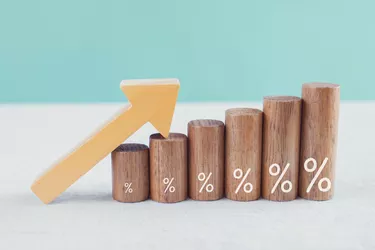
With mortgage interest rates now higher than during the last three years, you might wonder what you can do as a first-time homebuyer to save money. While you can't control the effects of market changes, you can get a lower rate if you start the application process before rates rise further. In addition, you can take some personal finance actions to get the best mortgage rate. Savings strategies include choosing the right rate structure, having a good credit profile, putting more money down and looking into buying discount points.
Consider also: Explainer: What's Happening With Mortgage Rates?
Video of the Day
Video of the Day
1. Lock in Your Interest Rate
If you plan to buy real estate very soon, you can lock in the current mortgage rate with a lender for a month or two. To do this, choose a mortgage lender that provides this option to borrowers, and then submit your initial home loan application. You'll usually see rate lock details in your loan estimate, and there may be a fee involved.
Typically, the longer the rate lock, the costlier this option becomes. Also, keep in mind that you won't benefit from any rate decreases either during the lock. This means that rate locks are most beneficial in times of rising interest rates.
Consider also: 5 Ways Pre-Qualifying for a Mortgage Is an Advantage
There are different down payment requirements for options such as conventional loans, VA loans and FHA loans.
2. Opt for an Adjustable-Rate Mortgage
A fixed-rate mortgage is very popular since you can expect the same mortgage interest rate over the life of the loan. Therefore, homeowners find it easier to budget for mortgage payments. However, going with an adjustable-rate mortgage can give you a lower interest rate to start, and it can then go down or up depending on the market. This means a changing mortgage payment amount at certain points.
While this option can be appealing for lower payments during the first years of the loan, it can be a disadvantage to you if rates are higher when your lender adjusts your rate. There are options such as refinancing later, but keep in mind you'll incur several costs to refinance.
3. Improve Your Credit Situation
You'll get a lower mortgage rate with a good credit score than with a lower credit score. Therefore, check your credit report through the credit bureaus for delinquencies to correct and pay down debts like credit cards to help boost your score. A side benefit is that lowering your overall debt also improves the debt-to-income ratio that lenders use to assess your mortgage affordability.
Consider also: What Is a "B" Credit Rating?
4. Contribute a Higher Down Payment
There are different down payment requirements for options such as conventional loans, VA loans and FHA loans. However, you can often land a better rate by paying more than the minimum required upfront, and you can save money in other ways by doing so too.
For example, putting down 20 percent of the purchase price for a conventional loan helps you avoid private mortgage insurance (PMI). This lets you enjoy an even lower monthly mortgage payment. In addition, financing a lower amount might help you afford a 15-year mortgage loan term and further save on interest.
5. Consider Buying Discount Points
If you don't mind paying an upfront fee, you could lower your mortgage interest rate by buying discount points from your lender. You can buy points in whole or decimal amounts where each point costs 1 percent of your mortgage. For example, buying two mortgage points for a $200,000 mortgage would cost $4,000 compared to $2,000 for one point.
The more points you buy, the lower your mortgage rate should be. Mortgage lenders can show you the specific costs and savings so you can decide.
Keep in mind that the payment for the points is added to your closing costs, so this means you'll need more money set aside to buy a home. The deal also isn't as good if you plan to not have the mortgage loan for a long time such as if you're someone who frequently moves. In that case, you might do better with no points and a higher interest rate.
Consider also: What Is "Points" on a Mortgage?
- Bank of America: How Credit Scores Affect Your Mortgage Rate
- Consumer Financial Protection Bureau: What Is Private Mortgage Insurance?
- Bank of America: Adjustable-Rate Mortgage Refinance
- Chase: The Best Time to Lock a Mortgage Rate
- Consumer Financial Protection Bureau: What Are (Discount) Points and Lender Credits and How Do They Work?
- Bank of America: Mortgage Rates
- CBS News: Mortgage Rates Are Rising Faster Than They Have In More Than a Decade